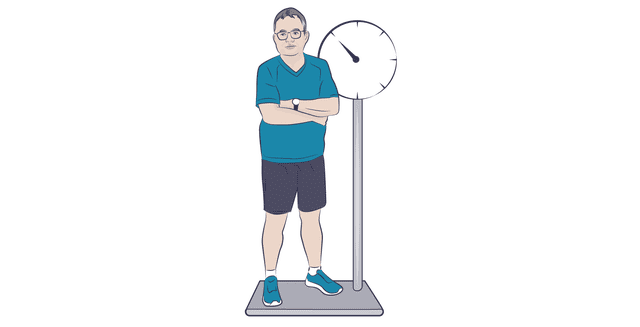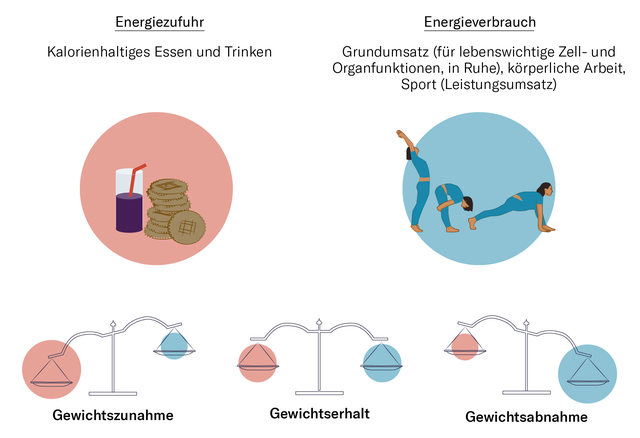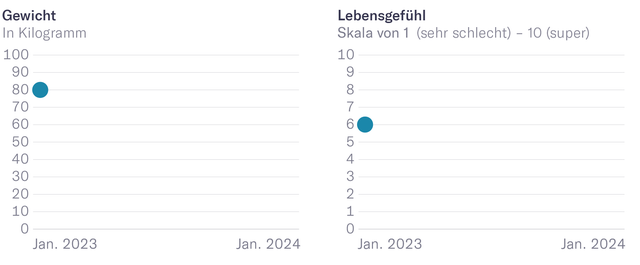On January 1st I changed my eating habits and started exercising regularly. I’ve already lost two kilograms of weight. Why that’s no reason to celebrate and why the energy balance remains the measure of all things when losing weight.
My resolution for 2023: I want to lose 10 kilograms and get fitter by the end of May. Every Saturday I write about how I am doing on my journey to a healthier life and what there is to consider when it comes to overweight and losing weight.
blog – My way to a healthier life (1)
1. Results
2. Experiences
Sorry but I have to start like this. With a sentence that everyone has already heard: Losing weight begins in the mind. That’s not very original, I know. Because everything we do starts in the head. Where else? In the stomach?
I like that sentence anyway. Because he makes it clear that one should deal with the subject of overweight and losing weight before taking action. I took several months to do this. To research, to talk to experts and to ask myself questions. For example: Which sport do I want to do as endurance training?
I decided to do Nordic Walking. It could also have been jogging, cycling or swimming. So why Nordic walking? Because this sport suits me and my preferences well. That seems to be very important to me, after all the training should be fun in the long term.
Because even if the self-experiment is officially over after five months, I will have to maintain my new lifestyle beyond this time. Otherwise I’ll quickly get back into the old waters. Where “must” is the wrong word. I want this from the bottom of my heart and with great joy: get slim and stay slim. To feel better, healthier and fitter again, as I wrote in the kick-off article for this self-experiment.
3. Facts and connections
As the current values in the infographic above show, things are going well so far. The fact that I’m already feeling a little better can also be explained by a certain initial euphoria. The objective data also point in the right direction. Lost two kilograms in just under a week! That’s great, but sounds like more than it is. Because I shouldn’t have lost most of my fat mass, but water.
This has to do with the fact that the body is very systematic when it comes to losing weight – and treats its fat reserves like a sacred cow. He only burns them when there is no other way. The organism prefers to use sugar (carbohydrates) as a source of energy. Therefore, when you lose weight, the “sugar” depot in the liver and muscles is first plundered. This so-called glycogen storage consists of dextrose building blocks (glucose) and binds a lot of water. With the glycogen breakdown, the water is also lost: the body weight decreases.
If you go completely without food for a long time, you will have used up your glycogen stores after about a day. It should take a little longer for me, since I continue to eat, but simply less. This brings us to a central topic: losing weight not only begins in the mind, but also with a negative energy balance.
What does that mean? To lose weight, you have to consume less energy than you expend. Because we humans take in our energy in the form of food and the energy is referred to as calories (actually kilocalories, kcal), one can also say: In order to lose weight, we have to eat and drink fewer calories than the body burns.
That actually sounds quite logical. Nevertheless, this biochemical law of nature may not be known to everyone equally. Otherwise we wouldn’t constantly hear sentences like: “My brother can eat as much chocolate as he wants, he doesn’t gain weight. For me, on the other hand, it is enough if I look at the chocolate and the weight is already pointing upwards.»
That you get fat from the sight of food is of course nonsense and usually not meant too seriously. More interesting is the statement about the brother: You should know what else he eats besides chocolate and what his sports program is like. Only then can you assess your energy balance.
But how can I calculate my calorie consumption? Roughly speaking, the basal metabolic rate for an adult at rest is 1 kcal per kg of body weight and hour. The heavier you are, the higher the basal metabolic rate. But that also means: If I lose 10 kilograms with my 82 kilograms, I then have a lower calorie requirement and have to eat less. If this is not taken into account, the weight will quickly increase again after the successful slimming down. That is one of the reasons for the dreaded Jojo effect.
If you want to calculate your basal metabolic rate relatively precisely, in addition to body weight, you also take into account age (older people have a lower basal metabolic rate than younger people), gender (women have a lower basal metabolic rate than men) and height. This can be done with the so-called Harris-Benedict formula: If I enter my data here, my daily basal metabolic rate as a 55-year-old man who is 1.72 meters tall is 1683 kcal.
In order to know the daily calorie requirement, I have to add the performance turnover caused by physical exercise to the basal turnover. There is also for that useful calculators on the internet. As an office worker with relatively little extra exercise, my body burns around 2600 kcal every day. With regular physical activity I can increase the value to 2850 kcal.
All this math isn’t meant to make us strict calorie counters. However, it can remind us of a few important facts:
- The majority of the daily calorie requirement for most people is consumed by the body’s basal metabolic rate and not by physical activity. (Exceptions are physically very hard working people who can also burn 8000 kcal a day.)
- Regular exercise can increase your calorie needs. However, the effect is rather modest for the average recreational athlete.
- If you want to lose weight quickly, you’d rather cut out calories when eating than go jogging for an extra lap. This is especially true in the initial phase of losing weight.
- Because the basal metabolic rate is so important for the energy balance, it is an advantage if it does not decrease with weight loss. For this, it is necessary to increase physical activity that strengthens the cardiovascular system and muscles.
- From all of this follows: If you want to lose weight healthily and keep your weight in the long term, you have to pay attention to diet and exercise. The two factors are not either/or, but both/and.
PS: Next time I will write about my diet. Calories will not play the main role in this. . .
Collaboration on the project: Frank Brunner, Reto Gratwohl, Marit Langschwager, Severin Pomsel, Annick Ramp.



